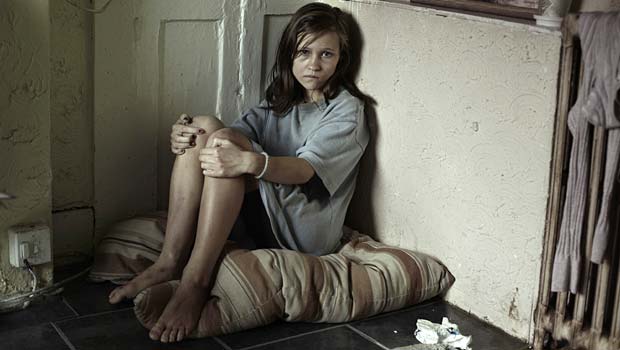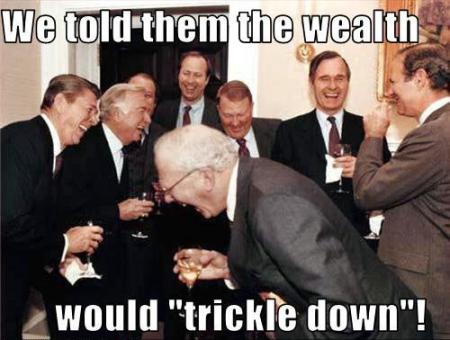Econ 101: What is Privatisation? What is Deregulation? What is Self-regulation? What is Economics of Fools?
Answer:
Capitalism for the 99% and Socialism for the rest: Where profits and benefits are privatised for the 1%, whilst costs and austerities are socialised for the masses.

Socialism for the 1%
Photo: betanews.com

Capitalism for the rest
Photo: theprisma.co.uk
A Warning to all those who voted for the Tories in the 2015 General Election!
David Cameron has vowed to make Great Britain “greater still”. The big question is: Greater than What? Greater than what his idol, Margaret Thatcher did?*
As Paul Krugman writing in the New York Times has noted: “Words,” wrote John Maynard Keynes, “ought to be a little wild, for they are the assault of thoughts on the unthinking.” And “I have to admit that in the long slump that followed the 2008 financial crisis — a slump that we had both the tools and the knowledge to end quickly, but didn’t — the unthinking were quite successful in fending off unwelcome thoughts.”
Moreover “nowhere was the triumph of inanity more complete than in Keynes’s homeland… Britain’s election should be a referendum on a failed economic doctrine, but it isn’t, because nobody with influence is challenging transparently false claims and bad ideas.”
Given the outcome of the election, it is tragic that those on the Left and Progressive politics running for election failed to challenge the economic nonsense peddled by the Conservatives. They also failed to challenge most of the biased, right-wing British news media, reporting bad economics as truth.
But, as Krugman writes: “hard thinking has been virtually excluded from British public discourse. As a result, we just have to hope that whoever ends up running Britain’s economy isn’t as foolish as he pretends to be.”
The Economics of Fools that Won the Day on 7 May 2015
Debunking the Economics of Fools
'Today the dominant narrative is that of market fundamentalism, widely known in Europe as neoliberalism. The story it tells is that the market can resolve almost all social, economic and political problems. The less the state regulates and taxes us, the better off we will be. Public services should be privatised, public spending should be cut and business should be freed from social control. In countries such as the UK and the US, this story has shaped our norms and values for around 35 years: since Thatcher and Reagan came to power.’

Pity the voters believing in Economics of Fools!
Photo: miamiautonomyandsolidarity
On 3 June 2011 I wrote a Blog under the title of “The Broken Model”. Due to its relevance to this Blog, I wish to note some key excerpts from it once again:
“Do you remember that Margaret Thatcher, the so-called Iron Lady!! She told the Brits that she was going to put the “Great” back into the “Great” Britain. Do you remember? Then, she told us this can only happen if we accept and implement the “Washington Consensus”, the so-called dreaded neo-liberalism. She told us that there was no alternative. She told us we will all prosper and develop more fairly and equitably. She won election after elections. Everything was privatised, deregulated, self-regulated. Industry, manufacturing, (the real economy) was destroyed. Instead, the banks and the bankers were encouraged to rule the world. The economists with no principles and values were “bought” and the business schools, such as Harvard and Columbia were showered with money to act as “Cheer Leaders” for the dreaded neo-liberalism (see the Inside Job for evidence). Communities were dis-mantled and dis-organised. We were told that there is nothing as a society and community. We are all in it just for ourselves, we were told. Destructive competition at the expense of life-enhancing cooperation, collaboration and dialogue was greatly prompted. We were told to say no to love, kindness, generosity, sympathy and empathy and say yes to selfishness, individualism and narcissism, as these values will fire the engine of capitalism and wealth creation! In short, the hell with the common good, we were encouraged to believe.
We were brained-washed. Our other Prime Ministers repeated her nonsense and have carried on her footsteps. It is now over 30 years since the neo-liberalism experiment in Britain. Are we any “Greater” than we were in 1979? Are we any fairer or more equitable? The country is nearly bankrupt, with public and private debt at unprecedented levels, with greatest levels of poverty and wealth disparity ever. The house of neo-liberal capitalism is now at its nadir of decadence.”
You see, all those interested in life’s bigger picture, have been saying the same, over and over. The neo-liberals are not in touch with humanity. They will prostitute all in the interest of profit maximization, cost minimization, highest return to the shareholders, and the biggest and juiciest bonuses for the CEOs and their lackeys.”
The statistics that tell the truth about Britain today:
- Britain’s richest 1% have accumulated as much wealth as the poorest 55% of the population put together (ONS)
- The household disposable income for the richest increased last year, but fell for everyone else (TUC)
- IFS)
- Foodbank use is increasing exponentially with a million people using foodbanks in 2013/14 and 350,000 in 2012/13. Also increasing are the diseases of malnutrition such as rickets. (Trussel Trust) (Faculty of Public Health)
Moreover, Work, for many millions, regrettably, in Britain today is not a sure way out of poverty either:
- A record 5.2 million UK workers are now in low-paid jobs, up by 250,000 since last year (Resolution Foundation)
- 66% of children growing up in poverty live in a family where at least one member works
- There are now more people in working families living below the poverty line (6.7 million) than in workless and retired families in poverty combined (6.3 million) (JRS)
- 1:4 employees on minimum wage are still on that rate after 5 years (Resolution Foundation)
There are many people who feel that they don’t belong, who feel alienated: who look around them and find that they cannot participate in the life which most people enjoy. In this country that implies a certain standard of living – to be able to have a stable, decent home, food and warmth, an occasional holiday: To be able to afford the costs of transport to work, necessary household goods and shoes for the children: And computer access, now seen as a basic tool in all Government welfare support and formal dealings.
A surprising number of people are unable to meet the most modest conditions in our society today:
- Those who are homeless, often struggling with chaotic live and health or addiction problems
- Those who become unemployed, with no or little savings or capacity within the family to soften the blow
- Those who are underemployed, self-employed, or on those zero-hour contracts which are exploitative – precarious employment conditions
- Those who are simply and long-term on low pay
There are others who are struggling with static pay against a background of rising costs; or those whose pay is brutally reduced as the contract regime is introduced; asylum seekers in various types of bureaucratic stasis who are not allowed to work yet have no access to public funds, many of whom are frankly destitute; and those outside society almost by definition – the victims of trafficking for example. (*The above statistics and excerpts were taken from an article by Helen O’Brien. For the original source see below).
In short, this is the real story of life for many British people today.
Is it not tragic that once again the economics of fools won the day and many were fooled and foolishly voted against their own best interest.
And is this not the time that all Progressive people come together, working for the common good, co-authoring and co-creationg the better world we all wish to live in? Imagine that!
In the country I wish to see, we value ourselves, and we value each other. In this new country, it is an honour to serve, where the highest good is the common good

Economics of kindness, generosity, happiness, well-being and prosperity for all
Photo: virtuesforlife.com
The future is full of risk and perils for our planet and all peoples. If we are to survive we must surely build cultures of peace, justice, kindness, and trust, and we must walk together to face the future. The journey, for sure, will be much more secure and fruitful if we begin to walk the walk together for the common good.
Imagine a political system that puts the public first. Imagine the economy and markets serving people rather than the other way round. Imagine us placing values of respect, fairness, interdependence, and mutuality at the heart of our economy. Imagine an economy that gives everyone their fair share, at least an appropriate living wage, and no zero-hour contracts. Imagine where jobs are accessible and fulfilling, producing useful things rather than games of speculation. Imagine where wages support lives rather than an ever expanding chasm between the top 1% and the rest. Imagine a society capable of supporting everyone’s needs, and which says no to greed. Imagine unrestricted access to an excellent education and healthcare. Imagine hunger being eliminated, no more food banks and soup kitchens. Imagine each person having a place he/she can call home. Imagine all senior citizens living a dignified and secure life. Imagine all the youth leading their lives with ever-present hope for a better world. Imagine a planet protected from the threat of climate change now and for the generations to come. That’s the country I wish to see and I believe we have the means to do it, if we all act in the interest of the common good.
Read more:
Paul Krugman:
Triumph of the Unthinking - NYTimes.com
Helen O’Brien:
Helen O'Brien - Together For The Common Good
Further reading:
People’s Tragedy: Neoliberal Legacy of Thatcher and Reagan
Britain Today: Socialism for the 1% and Capitalism for the Rest
UK General Election 2015- Why the Progressives failed so badly?
The Destruction of our World and the lies of Milton Friedman
UK General Election 2015: Breakthrough for the common good – Dare to imagine that
